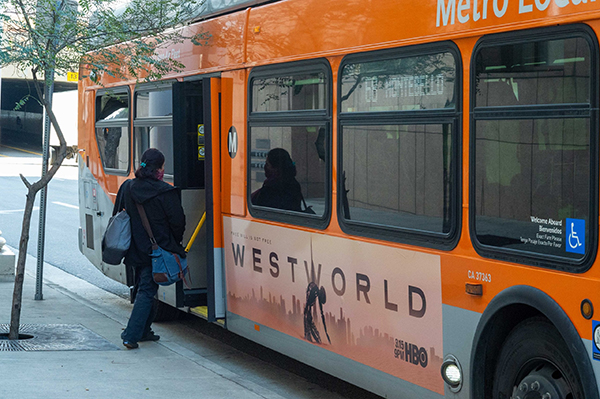Wave Wire Services
LOS ANGELES — The Metropolitan Transportation Authority Board of Directors has tentatively advanced plans for a 23-month pilot program that would make buses and trains free for students and eventually for low-income riders, but it wants more details on the proposal’s finances before implementing it.
During its meeting May 27, the board requested reports from its staff on how the fare-free program would be funded and on what efforts would be undertaken to ensure the program does not negatively impact overall service or affect the ability to keep the transit system in a state of good repair.
Once those reports are completed, the board will again review the proposal and take a final vote. No immediate timeframe was given for when that discussion will be held.
The MTA currently offers fare discounts to people who make $39,450 a year or less, people age 62 and older, veterans and people with disabilities, kindergarten through 12th-grade students and people in college or vocational school.
Under the pilot program, K-12 students and people enrolled in community college of all incomes would be the first to ride buses and trains fare-free, followed later by low-income riders, who make up 70% of the system’s ridership.
Original plans called for the first phase of the program to begin in August, but the board’s request for additional reports leaves the exact timing up in the air.
The 23-month pilot for K-12 and community college students is expected to cost $49 million in lost fare revenue, according to MTA officials.
Fare revenue pays for transit operations and maintenance, but the MTA receives additional funding through sales tax and state and federal grants. Additional funding options for the pilot identified by transit officials include advertising revenue, cost-sharing and grant funds through the traffic reduction program.
Glendale City Councilman Ara Najarian again expressed concerns about one-time funding being used to bankroll the program.
Los Angeles Mayor Eric Garcetti said during an executive management committee meeting last month that he was confident the agency would generate enough funding. During an April board meeting, Garcetti said the MTA will “leave no stone unturned when it comes to funding,” and emphasized the need for the federal government, the state and municipalities in the county to chip in.
In a survey with about 46,000 responses, the MTA found that 86% of its riders and 80% of non-riders support going fareless.
The pilot program will allow the MTA to test the feasibility of permanently eliminating all fares on trains and buses. After the pilot concludes, the board will consider extending, modifying or discontinuing fareless service. To help inform that decision, MTA staff will report to the board each month on the status of the pilot program.
Metrics that will evaluate the success of the program may include financial sustainability, program participation, increased boarding by pilot participants, level of service, quality of services, increased trip by low-income riders, employee safety, rider safety and system security, according to MTA Principal Transportation Planner Doreen Morrissey.











